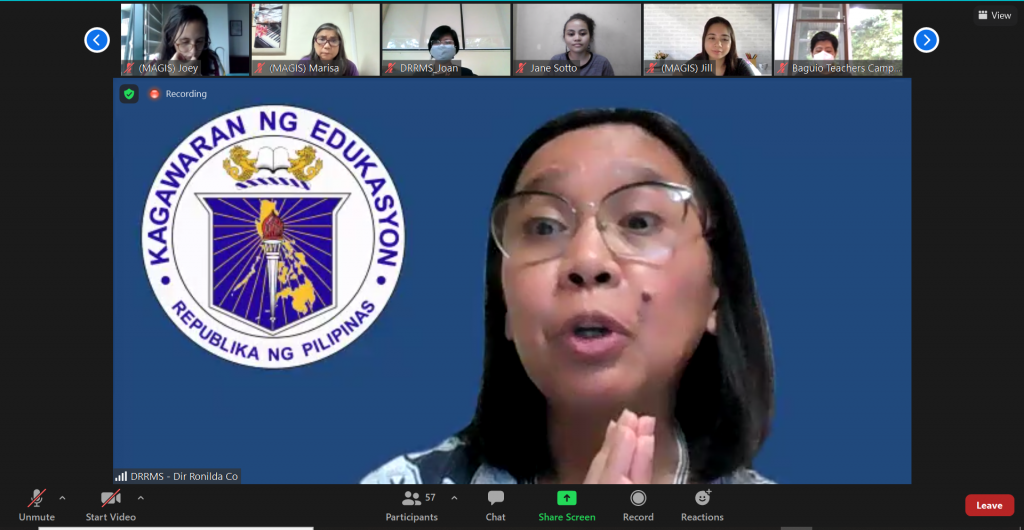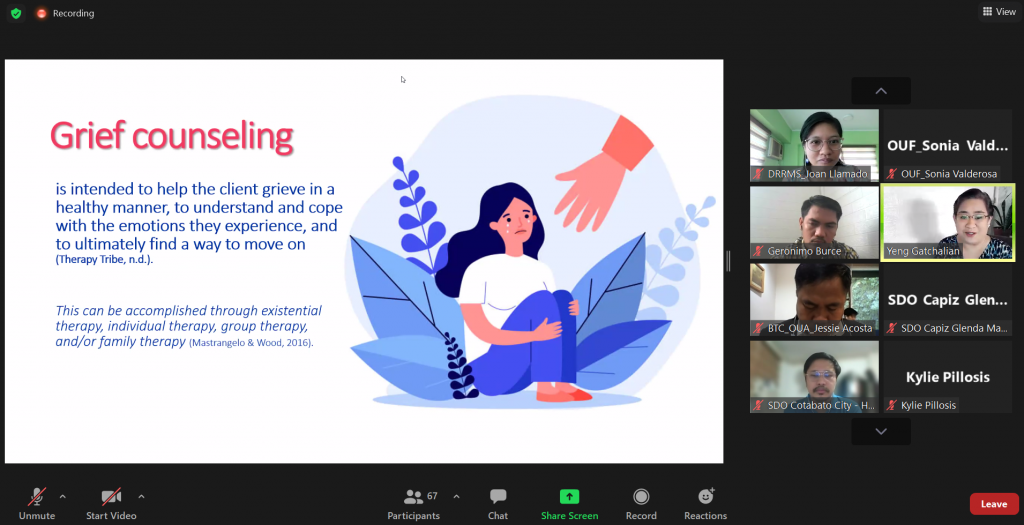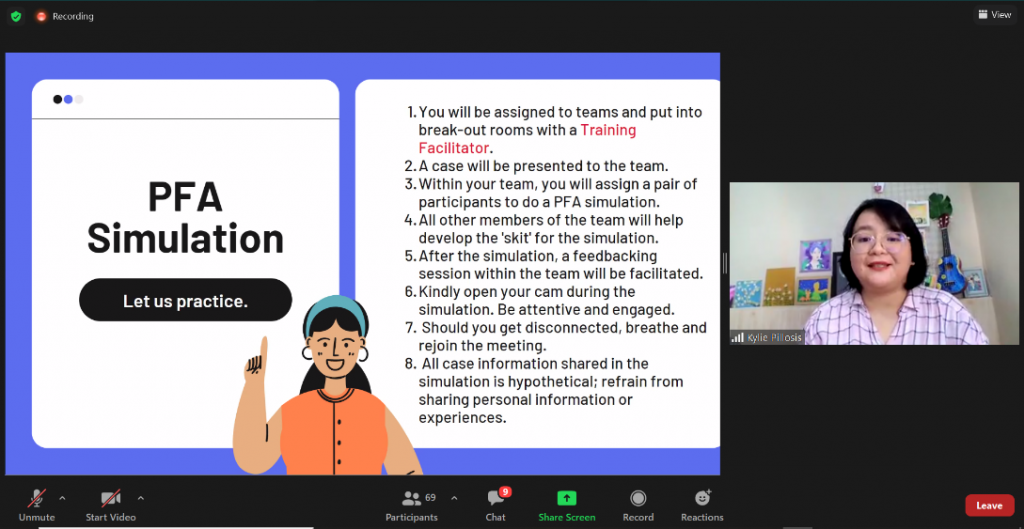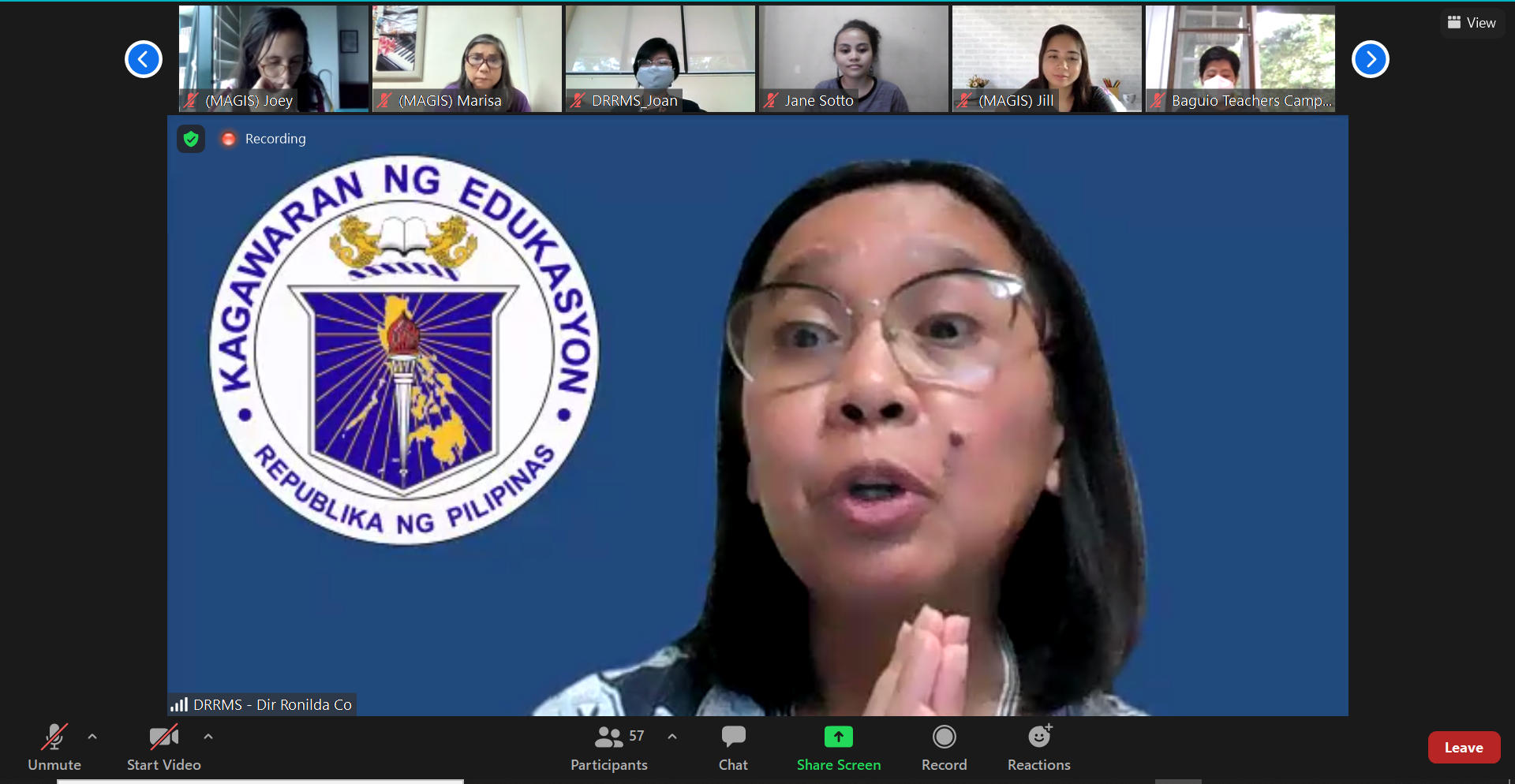
The Department of Education, through the Disaster Risk Reduction and Management Service (DRRMS), organized a three-day Psychological First Aid (PFA) Training for its Central Office employees from September 8-10, 2021 via Zoom.
DRRMS Director IV Ronilda Co discussed the significance of this training to all personnel and emphasized the need to provide a PFA trainer and support in each office. Training facilitators from various regions in Luzon, Visayas, and Mindanao joined the webinar for the three-day event.


DRRMS Project Development Officer IV Mr. Orlando Barachina thoroughly explained the legal bases and mandate of the Disaster Risk Reduction and Management as well as its basic terminologies. He also shared the vulnerability of the Philippines in terms of hazards.


Meanwhile, Professor Yeng Gatchalian, RPsy served as the first resource speaker wherein she highlighted the importance of giving remote PFA to colleagues and friends during the COVID-19 pandemic. She urged everyone to put his or her heart on the training and provided insightful messages that would help training participants to further broaden their knowledge not only on PFA, but to the whole mental aspect. One of the highlights of Prof. Gatchalian’s presentation was her discussion on the three Action Principles: Look, Listen, and Link wherein she encouraged everyone to understand the person’s situation, perceived dangers and needs. She also added that listening attentively is important when talking to a person. Prof. Yang emphasized the need to enhance sense of control, support good personal choices, and encourage seeking support. For the second core action Listen, Prof. Yang reiterated that empathy is way different from sympathy and that people can show their warmth through showing attention, affirmation, and by using a calm tone. As per the third core action, Link, Prof. Gatchalian, reminded to always ask if further help is needed and to always check on the person.

On Day 2 of the PFA training, the participants listened again to Prof. Gatchalian’s topic entitled “On Grief and Loss.” Her talk dealt with the encompassing meaning and varied manifestations of grief to people. She explained that grief is not limited to death but a reaction to any form of loss, including jobs, loved ones, etc. She reminded everyone that all feelings are valid, including grief. Everyone is entitled to emotions; however, it is the behaviors that entail with it that must be carefully observed. She elaborated as well that grief may be coped with not but stopping it but by letting oneself go through with it. Other topics she covered were the three models of grief, type of griefs, difference of grief and depression, and grief counselling.

Afterwards, she proceeded on the “self-care.” She shared practical ways on how one can take care of his/her overall well-being especially as PFA providers. She introduced the ARMS method which stands for Aware, Recognize, Manage and “Salamat.” She encouraged everyone to be aware of or reset his/her baseline, if applicable, and establish awareness of stressors. Next, start recognizing the difficulties and accept that it is okay to have a trial and error. Once done with these, it is the time to manage behaviors and routines and take time to recharge and switch off from work from time to time. Lastly, she urged everyone not to forget saying “salamat” and appreciating even the most little things in life.
Aside from the informative and enlightening discussions facilitated by Prof. Gatchalian, other activities held on the second day of the training were the role-playing of PFA providers led by the national PFA trainers, and the monitoring and evaluation tool being used by the DRRMS relative to the conduct and completion of PFAs in DepEd, covered Ms. Amina Aisa Boncales of DRRMS.


On the last day of the training, the participants went through an Art-based Kumustahan Session spearheaded by MAGIS, an invited group of psychologists and facilitators who carried out different activities focusing on grief and loss. On this session, the participants were able to experience different ways of relaxing one’s self, express their thoughts and emotions involved in grief and loss through the Mask Making Activity and share themselves and support one another through the break-out session. During the debriefing, the participants were reminded that all emotions are valid and must be acknowledged. Grief may linger for the longest time but it can also co-exist with love, strength, joy, beauty and gratitude along the way.



The 3-day training was concluded with the reading of the poem entitled “today, perhaps” by Therese Jose and Dr. Co assuring all participants that relative trainings and kumustahan sessions are in place to ensure the overall well-being of the employees are prioritized.

Jem Beryline Bualat, Jonnabel Escartin
